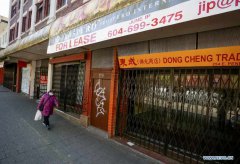Indigenous town in Mexico survives on remittances from US
Comachuen is a Puerpecha Inidgenous community of about 10,000 inhabitants nestled high in the pine-clad mountains of the western state of Michoacan
January 26, 2022, 5:10 AM
6 min read
Share to FacebookShare to TwitterEmail this articleCOMACHUEN, Mexico -- In Comachuen, a Purepecha Indigenous community of about 10,000 inhabitants nestled high in the pine-clad mountains of the western state of Michoacan, the whole town survives because of the money sent home by migrants working in the United States.
That money, known as remittances, kept families fed after local woodworking sales dropped off a decade ago when pine lumber started to become scarce. The money has allowed their families to remain in Comachuen rather than moving to other parts of Mexico for work. That — and the fact kids spend much of the year with their mothers and grandparents — has helped preserve the Purepecha language among almost everyone in town.
The traditional textiles, woodworking and construction live on, largely because such enterprises are funded by migrants who send money home to build houses here. Many things here — the church, the bull ring, the charity donations — are paid for by migrants.
The Mexican government believes remittances last year will surpass $50 billion for the first time. But whether the remittances allow families to just survive or progress enough so their kids won’t have to emigrate varies, reflecting a person’s plans and outlook.
The cold winter mornings in Comachuen are a throwback to another era. The men are back in town because of the seasonal lull in agricultural work in the United States.
Many workers from Comachuen get H2A temporary U.S. work visas, while others go without documents. Hundreds of men here work at the same vegetable farm in upstate New York every year, planting onions, harvesting squash, cabbage and beans. Porfirio Gabriel, an organizer who recruits workers to go north, estimates that one farm alone has brought $5 million into the town over three years, by far its largest single source of income.
Inhabitants exchange greetings in Purepecha as they pass each other in the narrow streets. At one end of town, three drovers head their teams of oxen through the streets and into the surrounding hills to haul down freshly cut pine trunks on narrow carts. The tree trunks are laid in the street in front of the homes of those who purchase them, to be sawn down in backyard workshops.
The whir of wood lathes mixes with the shouts of men hauling bricks and wheelbarrows of sand and gravel into half-built houses. Comachuen comes alive in winter.
Tranquilino Gabriel — it is a common last name here — is turning out decorative wood spindles on a primitive lathe. The 59-year-old does this only on his downtime from working in the U.S., to keep his decades-old family business alive. The 5 pesos (25 cents) he gets for each is just supplementary income.
He says wood is getting scarce and it’s unclear how much longer they will be able to do it. “More people are clearing land and planting avocado trees,” Gabriel says.
Gabriel is resigned to working in the United States as long as he can. He sends home about $7,500 each year from what he earns working the fields. That money is largely used to fund his children’s education, paying private college fees so his eldest son can be a registered nurse.
His hope is that his children will get university degrees and not have to emigrate. “I am paying for their studies, so that they don’t have to do what we had to do,” Gabriel says.
Apart from spindles, which are shipped to a nearby town to be assembled into bookcases and shelves, the economy here largely involves migrants selling to other migrants.
José González, 55, works at the corner shop that he remodeled, stocked and extended with money he has earned over a decade working in the United States.
González, who has the stern, thoughtful face of an Indigenous drill sergeant, says he used to do woodworking, “but it wasn’t enough to meet our basic needs.” After working the fields in Mexico for a while, he had to emigrate. Now his well-stocked store sells canned goods and food to the families of migrants.
Omar Gabriel, 28, sells sand, gravel, cement and rebar to migrants who are building or expanding their homes in Comachuen with money they earn in the U.S. Gabriel, one of the younger and better educated of the migrant workers, studied accounting at a university nearby. He has plans that don’t include forever going north to plant onions each spring.
His money from U.S. farm work goes to expand the family firm, Don Beto Materials, and pay for his younger brother’s university education as an architect. The family just bought a used bulldozer with money he earned in the north. Previously they bought a dump truck.








